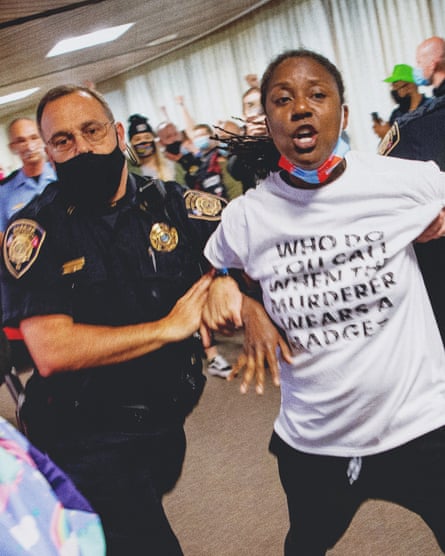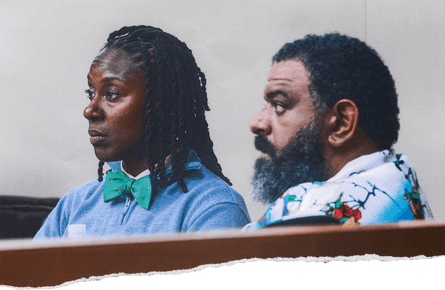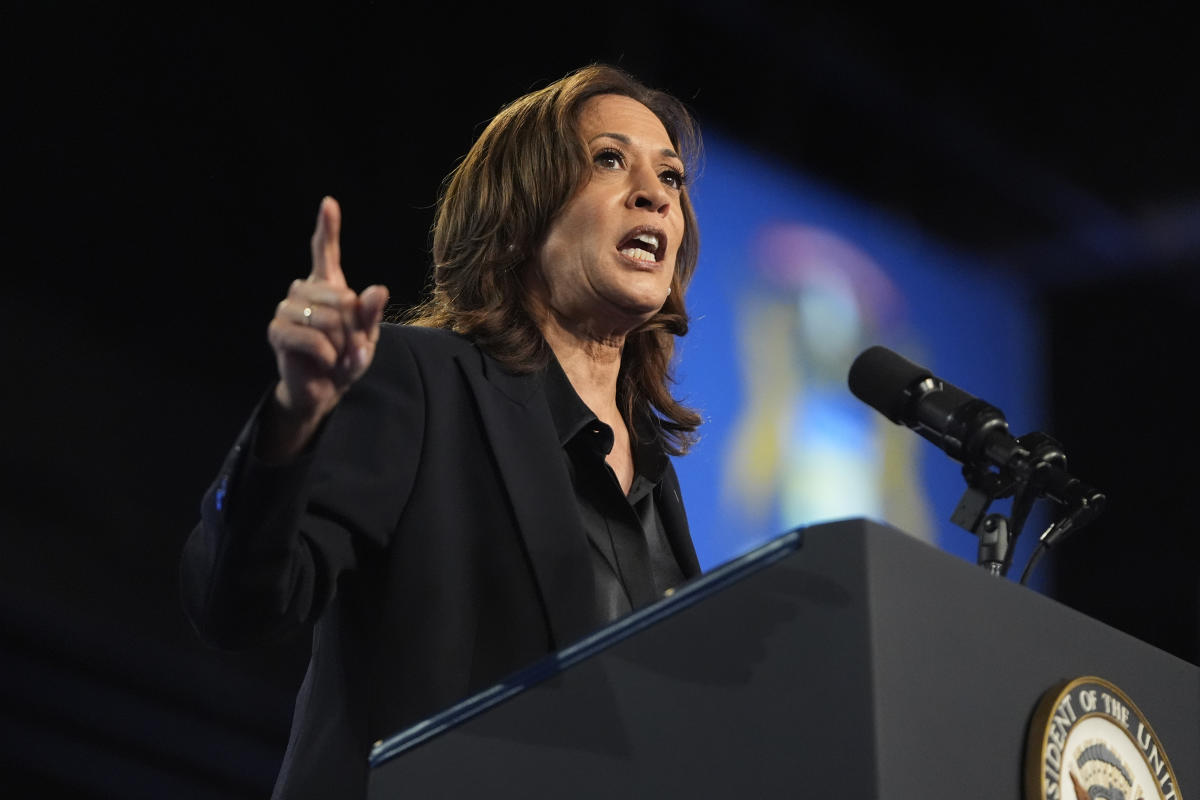The Knox county commission was questioning a property developer one evening in April three years ago when protesters quietly filed in to their auditorium and raised their fists in the air.
A week earlier, police had shot and killed 17-year-old Anthony Thompson Jr in a bathroom at his high school after they found him with a gun. Protests erupted in Knoxville, the county seat and largest city in eastern Tennessee, and one the loudest voices speaking out was Constance Every, who had organized demonstrations in the city during the national outrage that followed George Floyd’s death less than a year earlier. Now, she was in the county commission chamber with about two dozen others, intending to press them for the release of police body-camera footage that captured Thompson’s death.
As the protesters lined up near the meeting room’s back wall, Every, who was wearing a Black Lives Matter shirt, retrieved from her backpack a white T-shirt Thompson’s aunt gave her, which read: “Who do you call when the murderer wears a badge?” Then, she pulled out an electronic bullhorn, and sounded the siren.
“Knox county, county commission, your meeting is over,” Every said through the bullhorn, as the protesters clustered around her. “’Cause what we’re not going to tolerate is that we got a kid who was murdered at Knox county schools, and y’all going to carry on like these children don’t deserve to have their rights and other factors. It is not OK, what you all are doing, whatsoever.”

Within seconds of the siren going off, sheriff’s deputies, both in uniform and in plainclothes, converged on Every, grabbing her and some of her group, and marching them outside. While many kept silent as they left, Every did not. “I have not broke any laws! I am exercising my right to peacefully assemble and use my freedom of speech, you fucking murderers!” she shouted.
The disruption lasted just over 70 seconds. But for Every and the six others arrested in the commission chambers, it marked the beginning of a three-year legal saga, after the county prosecutor charged them with disrupting a lawful meeting – a misdemeanor for which Tennessee’s Republican leaders had just months earlier doubled the punishment.
Since Floyd’s death in May 2020, Republican-led states have enacted laws expanding the definition of rioting to encompass protesters who stayed peaceful when others did not, protecting drivers who run over demonstrators that block roads and enhancing penalties against protesters who target oil and gas infrastructure and deface monuments. The International Center for Not-for-Profit Law (ICNL), which tracks the legislation, has found that hundreds of proposals have been made by state and federal lawmakers nationwide, and more than two dozen signed into law.
The push comes as the GOP’s standard bearer, Donald Trump, campaigns for the presidency on a platform that includes suppressing protests. He has vowed to deploy the national guard “where there has been a complete breakdown of law and order”, while simultaneously promising pardons for people convicted over the January 6 insurrection. As president, Trump reportedly encouraged the military to shoot protesters, and, this year, allies such as the speaker of the House of Representatives, Mike Johnson, have said the national guard should be used against college students demonstrating over Israel’s invasion of Gaza.
If he returned to the White House, Trump could direct a militarized response to protests and pressure congressional Republicans to pass legislation that would impose nationwide penalties like those already in effect in Tennessee.
Tennessee is a thoroughly red state where the GOP holds a supermajority in its general assembly. Last year lawmakers temporarily expelled two Black Democratic representatives who staged a noisy protest calling for gun control legislation in the state house chamber. In August 2020, Republicans passed a bill that increased penalties for blocking a street or sidewalk and created a new felony offense for protest encampments on state property, in addition to making disrupting a meeting a more severe category of misdemeanor.
The Republican governor, Bill Lee, justified the legislation as necessary to prevent “lawlessness”, and in the years since, he has signed two more anti-protest bills, one of which made blocking roads a felony, and the other of which expanded the definition of aggravated rioting and created a mandatory minimum sentence for people convicted.

“These laws that we are seeing in Tennessee are really representative of the kinds of tactics that we’re seeing nationwide in response to particular protest movements,” said Nick Robinson, a senior legal advisor at ICNL’s US program.
To Amelia Parker, a Black Lives Matter activist who now serves on the Knoxville city council, it is not surprising that Every wound up being perhaps the first person to run afoul of such laws.
“She’s one that authorities would want to make an example out of. They definitely would not want another Constance,” Parker said.
An African American army veteran who is disabled with post-traumatic stress disorder from two tours in Afghanistan, Every became politically active after struggling to find services during a period of homelessness in Knoxville, the home town she returned to after leaving the military.
“I’m not a sugar-coater, I’m not a person that’s going to come in and say, ‘with all due respect’. I’m not that,” Every said in an interview from her apartment, where a framed photograph of her speaking to protesters in a police station parking lot in the days after Floyd’s death hangs over the couch.
“I’m going to come in and tell you straight to your face the failures, the problems, and more importantly, you holding this role as a political, elected body or member, that you should hold a lot of accountability for what’s happening.”
Her leadership of the 2020 protests, which in Knoxville were generally peaceful, put her on the radar of local authorities, she believes. Tensions in the city escalated again following Thompson’s shooting on 12 April of the following year at Austin-East, a predominantly Black high school where, in the few months since the new year, four students had already died in shootings in its neighborhood.
Officers went to the school that afternoon to find Thompson after his ex-girlfriend reported him for assaulting her earlier in the day and warned he was known to carry a gun, an investigation by Knoxville’s police department would find. In a lawsuit filed against the city and the four officers involved in his death, attorneys for Thompson’s mother and his best friend would write that he carried a pistol because his ex-girlfriend’s family had threatened him, and because the streets around the school were unsafe.
The fours officers looking for Thompson found him in a bathroom stall with a gun. A struggle ensued, and after Thompson’s pistol went off and hit a garbage can, one of the officers fired twice, fatally wounding the teenager and injuring a school resource officer.
Days later, the Knox county district attorney general, Charme Allen, said she would not prosecute the officers who encountered Thompson. The lawsuit filed by his mother and friend was dismissed by a federal judge, who found the officers had qualified immunity – the controversial doctrine that limits law enforcement officials’ liability for some lawsuits. Their attorney has appealed the decision.
Every and other activists in Knoxville remember an atmosphere of distrust in the days after Thompson’s death, which was worsened by authorities’ decision to initially describe him as an “active shooter” and lead the public to believe the teenager was responsible for wounding the school resource officer, when he was in fact shot by one of their colleagues. They decided to hold protests to demand more details of what really happened, including the release of footage from the cameras the police were wearing on their uniforms.
“We knew we had to double down and, as activists, that we had to really rally around each other and dig in on having fortitude to ensure we put a spotlight to this,” said Calvin Skinner, a Baptist minister who has collaborated on social justice work with Every, and was arrested at the county commission meeting.
Days after Thompson’s death, Every, Skinner and others disrupted a school board meeting without issue. But when they went to the county commission meeting a week after the teen’s fatal wounding, they knew something was off. Dozens of sheriff’s deputies were waiting for them, and signs had been posted warning of the state’s law.
In the past, disruptions had not been uncommon at the Knox county commission. Like many local governments, the body had just weathered a tense period as they dealt with the Covid-19 pandemic, during which protesters opposed to mask mandates would sometimes start shouting at them during meetings, recalled the former county commissioner Dasha Lundy. The same thing would happen when people grew upset over zoning decisions, she said, but, to her knowledge, nobody from either group was arrested.
“I keep going back to the people who were not supportive of [mask mandates] and how they were interrupting our meetings, but they just so happened to be white folks,” said Lundy, who was the sole Black commissioner during her four years in office.
“They just tell them, be quiet, do this, whatever. They interrupted the meeting too, but we don’t want to talk about that.”
After Every began talking, the commission’s then chair, Larsen Jay, a Republican, gaveled the meeting into a 10-minute recess. When it resumed, he called the disruption “clearly a staged set-up for one purpose: to draw attention, to draw in police reaction, and to make this commission put in a very bad position”. He then added that anyone who wanted to speak could sign up for their public forum.
The seven protesters who were removed from the commission chambers were jailed for a few hours, then released and charged with disrupting a meeting. That was one of the offenses that the Tennessee general assembly had raised penalties for in their bill passed after Floyd’s death, upgrading it from a class B misdemeanor to class A, the most serious category that carries a maximum jail sentence of just under 12 months.

Though the protesters were a multiracial group, Every believes their cause made them a target. “If we were talking about anything else than Black Lives Matter, [there] probably would have been a whole different approach,” she said.
A spokeswoman for the Knox county sheriff, Tom Spangler, said he was unavailable to comment. A spokesman for Allen, the district attorney general, said she declined to comment, because the case was still “pending”.
The arrest came as a surprise to Mary Winter, a white Ihop manager who had traveled from a Tennessee city nearly two hours west to attend the protest. She didn’t think she was in danger of breaking the law and had walked into the chamber holding Every’s phone, which was streaming the protest on Facebook. That video, as well as another recorded by the Knoxville News Sentinel, shows that Winter stayed silent until she was detained, but in an affidavit, the deputy who arrested her accused her of disrupting the meeting by “yelling and encouraging others to do the same”.
“This sworn statement of this officer in my arrest affidavit, that was the basis for my being arrested. And it flat-out did not happen,” Winter said.
Shortly before the trial started on 8 April, Winter opted to plead guilty in exchange for six months of unsupervised probation and paying court costs. She was already on probation for felony attempted murder after shooting her husband, with whom she said she was in an abusive relationship, and feared a conviction that would send her to jail. Two other protesters, Carrie Hopper and Kevin Andrews, also took plea deals.
At the trial, attorneys for Every, Skinner and two co-defendants, Gavin Guinn and Aaron Valentine, attempted to convince the jury that prosecutors had failed to prove that they had “substantially” disrupted the meeting, as the statute demanded. Every testified that they never intended to halt the commission’s meeting, because that would defeat the purpose – rather, they wanted the lawmakers to use their power over the district attorney general’s budget to have the body-camera footage released. The video was made public two days after the protesters’ arrest.

The trial also answered the question of how the sheriff’s department was aware of Every’s plans: they had been monitoring her Facebook account.
“We’ll check various activist groups, activist individuals, individuals who somebody calls to us about and says they have concerns. And one of those individuals was Ms Every,” testified John Sharp, a sergeant in the Knox county sheriff’s office’s narcotics division, one of the plainclothes officers that removed Skinner from the commission chambers.
Both sides questioned Jay about why the mask mandate protesters were not arrested when they were disruptive. The commission chair replied: “I’m not aware that they got arrested” but “several of them were escorted out of the room after being disruptive. I don’t know what the result of their actions were afterwards.”
“And you say [these two parties] disrupted your meeting in similar ways?” asked Mike Whalen, Skinner’s attorney.
“Yes, basically shouting out and disrupting it from an auditory perspective,” the commissioner replied.
The prosecution, led by the deputy district attorney, Sean McDermott, put Every’s use of the bullhorn, and the protesters gathering around her, at the center of their case.
“Did any of the mask people pull a siren and announce that your meeting was over?” McDermott asked Jay. “No,” he replied.
In his closing argument, McDermott said: “The group was acting as one. They were protecting the one with the bullhorn, surrounding her, making it more difficult, slowing law enforcement down, stopping the meeting.”
After about six hours of deliberations, the jury found Every guilty, but acquitted the three other defendants. She was sentenced to nearly a year of probation. Her attorney, Andrew Beamer, has appealed the verdict.
Even with the heightened penalties, it was unlikely that Every would have been sentenced to jail, Beamer said. But he believes the new law serves as a “shot across the bow of everybody, that they weren’t going to let you protest in this way.
“I think that the state saying, ‘hey, we care about these protest laws, let’s charge people.’ I don’t think that was lost on the county here.”

 German (DE)
German (DE)  English (US)
English (US)  Spanish (ES)
Spanish (ES)  French (FR)
French (FR)  Hindi (IN)
Hindi (IN)  Italian (IT)
Italian (IT)  Russian (RU)
Russian (RU)  3 hours ago
3 hours ago























Comments